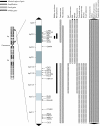Chromosome 6p amplification and cancer progression - PubMed (original) (raw)
Review
Chromosome 6p amplification and cancer progression
Gda C Santos et al. J Clin Pathol. 2007 Jan.
Abstract
Chromosomal imbalances represent an important mechanism in cancer progression. A clear association between DNA copy-number aberrations and prognosis has been found in a variety of tumours. Comparative genomic hybridisation studies have detected copy-number increases affecting chromosome 6p in several types of cancer. A systematic analysis of large tumour cohorts is required to identify genomic imbalances of 6p that correlate with a distinct clinical feature of disease progression. Recent findings suggest that a central part of the short arm of chromosome 6p harbours one or more oncogenes directly involved in tumour progression. Gains at 6p have been associated with advanced or metastatic disease, poor prognosis, venous invasion in bladder, colorectal, ovarian and hepatocellular carcinomas. Copy number gains of 6p DNA have been described in a series of patients who presented initially with follicle centre lymphoma, which subsequently transformed to diffuse large B cell lymphoma. Melanoma cytogenetics has consistently identified aberrations of chromosome 6, and a correlation with lower overall survival has been described. Most of the changes observed in tumours to date map to the 6p21-p23 region, which encompasses approximately half of the genes on all of chromosome 6 and one third of the number of CpG islands in this chromosome. Analyses of the genes that cluster to the commonly amplified regions of chromosome 6p have helped to identify a small number of molecular pathways that become deregulated during tumour progression in diverse tumour types. Such pathways offer promise for new treatments in the future.
Conflict of interest statement
Competing interests: None declared.
Figures
Similar articles
- Loss of chromosome 11q21-23.1 and 17p and gain of chromosome 6p are independent prognostic indicators in B-cell non-Hodgkin's lymphoma.
Stokke T, DeAngelis P, Smedshammer L, Galteland E, Steen HB, Smeland EB, Delabie J, Holte H. Stokke T, et al. Br J Cancer. 2001 Dec 14;85(12):1900-13. doi: 10.1054/bjoc.2001.2164. Br J Cancer. 2001. PMID: 11747333 Free PMC article. - A copy number gain of the 6p arm is linked with advanced hepatocellular carcinoma: an array-based comparative genomic hybridization study.
Chochi Y, Kawauchi S, Nakao M, Furuya T, Hashimoto K, Oga A, Oka M, Sasaki K. Chochi Y, et al. J Pathol. 2009 Apr;217(5):677-84. doi: 10.1002/path.2491. J Pathol. 2009. PMID: 19097070 - Chromosomal gains and losses in primary colorectal carcinomas detected by CGH and their associations with tumour DNA ploidy, genotypes and phenotypes.
De Angelis PM, Clausen OP, Schjølberg A, Stokke T. De Angelis PM, et al. Br J Cancer. 1999 May;80(3-4):526-35. doi: 10.1038/sj.bjc.6690388. Br J Cancer. 1999. PMID: 10408863 Free PMC article. - Chromosomal imbalances in gastric cancer. Correlation with histologic subtypes and tumor progression.
Noguchi T, Wirtz HC, Michaelis S, Gabbert HE, Mueller W. Noguchi T, et al. Am J Clin Pathol. 2001 Jun;115(6):828-34. doi: 10.1309/2Q9E-3EP5-KYPK-VFGQ. Am J Clin Pathol. 2001. PMID: 11392878 Review. - Comparative genomic hybridization (CGH): ten years of substantial progress in human solid tumor molecular cytogenetics.
Gebhart E. Gebhart E. Cytogenet Genome Res. 2004;104(1-4):352-8. doi: 10.1159/000077515. Cytogenet Genome Res. 2004. PMID: 15162064 Review.
Cited by
- Gain of Chromosome 6p Correlates with Severe Anaplasia, Cellular Hyperchromasia, and Extraocular Spread of Retinoblastoma.
Stålhammar G, Yeung A, Mendoza P, Dubovy SR, William Harbour J, Grossniklaus HE. Stålhammar G, et al. Ophthalmol Sci. 2021 Dec 11;2(1):100089. doi: 10.1016/j.xops.2021.100089. eCollection 2022 Mar. Ophthalmol Sci. 2021. PMID: 36246172 Free PMC article. - PPAR-delta promotes survival of breast cancer cells in harsh metabolic conditions.
Wang X, Wang G, Shi Y, Sun L, Gorczynski R, Li YJ, Xu Z, Spaner DE. Wang X, et al. Oncogenesis. 2016 Jun 6;5(6):e232. doi: 10.1038/oncsis.2016.41. Oncogenesis. 2016. PMID: 27270614 Free PMC article. - An accurate and powerful method for copy number variation detection.
Xiao F, Luo X, Hao N, Niu YS, Xiao X, Cai G, Amos CI, Zhang H. Xiao F, et al. Bioinformatics. 2019 Sep 1;35(17):2891-2898. doi: 10.1093/bioinformatics/bty1041. Bioinformatics. 2019. PMID: 30649252 Free PMC article. - Whole-genome sequencing identifies genomic heterogeneity at a nucleotide and chromosomal level in bladder cancer.
Morrison CD, Liu P, Woloszynska-Read A, Zhang J, Luo W, Qin M, Bshara W, Conroy JM, Sabatini L, Vedell P, Xiong D, Liu S, Wang J, Shen H, Li Y, Omilian AR, Hill A, Head K, Guru K, Kunnev D, Leach R, Eng KH, Darlak C, Hoeflich C, Veeranki S, Glenn S, You M, Pruitt SC, Johnson CS, Trump DL. Morrison CD, et al. Proc Natl Acad Sci U S A. 2014 Feb 11;111(6):E672-81. doi: 10.1073/pnas.1313580111. Epub 2014 Jan 27. Proc Natl Acad Sci U S A. 2014. PMID: 24469795 Free PMC article. - DEK associates with tumor stage and outcome in HPV16 positive oropharyngeal squamous cell carcinoma.
Smith EA, Kumar B, Komurov K, Smith SM, Brown NV, Zhao S, Kumar P, Teknos TN, Wells SI. Smith EA, et al. Oncotarget. 2017 Apr 4;8(14):23414-23426. doi: 10.18632/oncotarget.15582. Oncotarget. 2017. PMID: 28423581 Free PMC article.
References
- Pinkel D, Albertson D G. Array comparative genomic hybridization and its applications in cancer. Nat Genet 200537(Suppl)S11–S17. - PubMed
- Chen D, Gallie B L, Squire J A. Minimal regions of chromosomal imbalance in retinoblastoma detected by comparative genomic hybridization. Cancer Genet Cytogenet 200112957–63. - PubMed
Publication types
MeSH terms
Substances
LinkOut - more resources
Full Text Sources
Other Literature Sources
Medical
